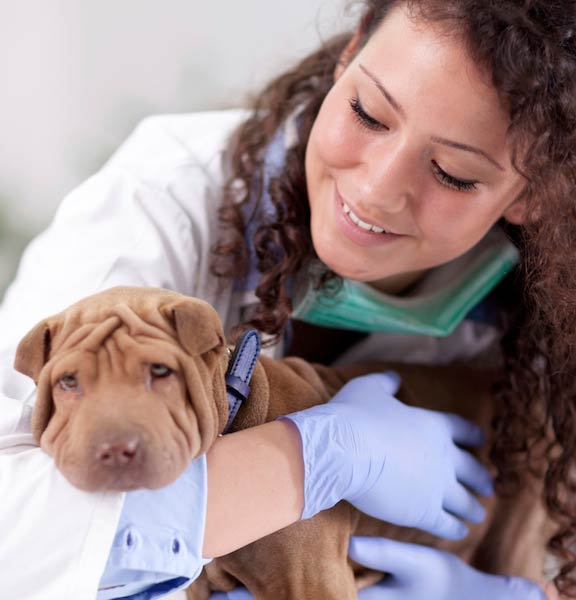How To Get Rid Of Roundworms In Dogs
What are roundworms?
- Roundworms are extremely common parasites in dogs. Almost all dogs have roundworms at some point in their lives—most often in puppyhood.
- There are two main species of roundworms affecting dogs: Toxocara canis and Toxascaris leonine. Toxocara canis causes more serious disease and can be transmitted to humans.
The canine roundworm Toxocara canis can be up to several inches long. ( Joel Mills /Creative Commons)
Adult roundworms live in the dog's intestinal tract, where they feed on partially digested food. The worms can cause malnourishment, which can be especially of concern in a small puppy. Younger dogs are especially vulnerable to roundworms because their immune systems are not fully mature yet and they aren't able to fight off the adult worms as effectively as an adult dog can.
How dogs get roundworms
- From their mother. It's very common for puppies to be born with roundworms, as the larvae are often transmitted from the mother just before birth or through nursing.
Here's how this happens: The canine roundworm has unfortunately evolved a very efficient way to propagate itself. If a dog has ever had roundworms, a number of dormant ("encysted") larvae can remain in body tissues, even if the dog was treated and the adult worms eradicated. These encysted roundworm larvae can remain dormant for the rest of the dog's life—unless the dog is a female and becomes pregnant, at which time the larvae reactivate and are then passed to her puppies. The puppies can be infected either while still in the mother's body or after they are born, through her milk. So even with a very healthy, well-cared-for mother dog and puppies, the puppies should routinely be treated for roundworms (see below), starting at a very young age. Owners of pregnant dogs should ask their vet about safe deworming treatment of the dam during pregnancy that could reduce transmission to the puppies.
Larvae that have been reactivated during the female's pregnancy can also remain in her body and make her sick.
Encysted roundworms can also progress to the adult form and cause sickness in male and female adult dogs who have certain underlying health conditions.

While playing outdoors, puppies and dogs can pick up roundworm eggs that got into the soil from the stools of infected dogs.
- From the environment. Puppies and dogs can become infected with roundworms by accidentally ingesting eggs from the environment—the eggs can be present in soil or on plants or other objects.
- From eating infected animals. Roundworm eggs can also be carried by small animals such as rodents, earthworms, birds, and some insects. These animals are not the roundworm's normal host, so in these species the egg never matures—but if a dog eats an infected animal, the egg can activate and grow into a roundworm once inside the dog.
Symptoms of roundworms
Although it is possible for a dog to have roundworms and not show any symptoms, there are certain signs that can accompany a case of roundworms.

Roundworms can especially be a health concern for puppies.
- Malnourishment. Roundworms live in the intestines, depriving the puppy or dog of nutrients from his food—thus symptoms of a heavy roundworm infection can include signs of malnutrition such as weakness, weight loss, and stunted growth.
- Potbellied appearance. When a case of roundworms is untreated, the parasites can multiply quickly in the intestines and grow to the point where the presence of numerous adult worms gives the puppy a potbellied appearance.
- Coughing. Roundworm larvae can migrate to the lungs and cause coughing and other respiratory symptoms, sometimes even serious conditions such as pneumonia.
- Vomiting or diarrhea. Roundworms can cause digestive upsets such as vomiting and diarrhea. Diarrhea can range from mild to severe.
- Worms vomited up or visible in stools.
When a dog has roundworms, the owner might see one or more of the worms in the dog's vomit or stools. Needless to say, it can be quite alarming (and disgusting) to see these large, pale-colored, spaghetti-like worms—sometimes still moving. If this happens, call your vet as soon as possible, explain what you saw, and make an appointment to bring your dog or puppy in for treatment very soon.
(If you see small, rice-size worms in your dog's stool, rather than roundworms these could be a common parasite called tapeworms that are carried by fleas. Contact your vet if you see or suspect any parasite affecting your dog.)
Diagnosis
- Your veterinarian can look at a fecal sample from your puppy or dog on a prepared slide under a microscope and check for the presence of roundworm eggs. A fecal exam such as this will typically be part of a puppy's first vet visit.
- If a roundworm infestation is light, the fecal sample may not include any eggs. Since roundworms are extremely common in puppies, experts recommend that the presence of roundworms be assumed in young puppies and to treat routinely every few weeks.
Can humans get roundworms from dogs?

It's important for people to pick up after their dogs right away in yards and outdoor areas to reduce the risk of roundworm transmission to humans .
The roundworms that affect dogs do not complete their full life cycle in humans. However, they can still make humans very sick. Significant health problems can result if a person accidentally ingests the eggs of canine roundworms, such if a child gets dirt in her mouth. In humans the eggs can turn into larvae that become encysted in various organs of the body, which can sometimes cause serious disease.
Because of the risk of transmission to humans, it is recommended that dogs receive treatment and preventative for roundworm and that dog stools in yards, parks, playgrounds, and other outdoor areas are picked up and removed right away. It's best to keep children from playing on ground known to be contaminated with dog feces, and to be sure that children's hands are washed frequently if they're playing outdoors where dogs may have been.
Roundworm treatment and prevention

- Your vet can provide a quality dewormer that will safely and effectively get rid of the worms.
- Your vet can provide a monthly heartworm medication for your dog that will also include ingredients to prevent and control roundworms on a continuing basis.
Be sure to talk with your vet for expert information on roundworms and any concerns you may have regarding the health and well-being of your puppy or dog.
Note: This article is designed to help inform you about roundworms in dogs and is not meant to take the place of a veterinary diagnosis or consultation. If you think your dog might have roundworms or any parasite, contact your vet right away to set up an appointment for an examination and to ensure that your dog receives the safest and most effective treatment.
You might also be interested in: Your Puppy's First Vet Visit: What to Expect
How To Get Rid Of Roundworms In Dogs
Source: https://www.akc.org/expert-advice/health/roundworms-in-dogs-symptoms-treatment-and-prevention/
Posted by: chatmanthavir.blogspot.com

0 Response to "How To Get Rid Of Roundworms In Dogs"
Post a Comment